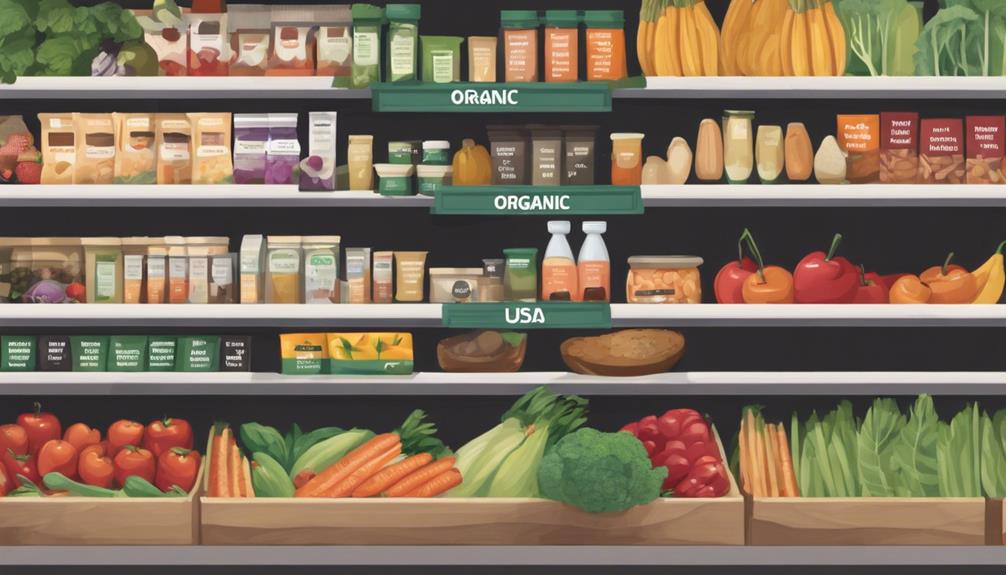Deciphering Certifications: Natural Vs Non-Natural Foods
When navigating the labyrinth of food certifications, distinguishing between natural and non-natural can be as perplexing as finding your way through a dense forest.
As you ponder over the labels on products claiming to be 'natural' or 'non-natural,' you might wonder about the true implications behind these designations.
Are they just buzzwords, or do they hold deeper significance in the realm of food production and consumption?
The answers may surprise you and shed light on an important aspect of your daily dietary choices.
Organic Vs. Non-Organic Foods
When choosing between organic and non-organic foods, it's essential to consider the differences in farming practices and potential health benefits. Organic foods are grown without synthetic pesticides, herbicides, and fertilizers, making them a healthier choice for you. These foods are also free from genetically modified organisms (GMOs), antibiotics, and growth hormones, which can have harmful effects on your health. By opting for organic products, you're reducing your exposure to these potentially harmful substances, thereby promoting your well-being.
In addition to the health benefits, organic farming practices have a lower environmental impact compared to conventional methods. Organic farming promotes biodiversity, conserves water, and reduces soil erosion. By avoiding the use of synthetic chemicals, organic farmers help protect pollinators like bees and butterflies, which are crucial for maintaining a healthy ecosystem. Choosing organic foods supports sustainable agriculture practices that prioritize the long-term health of the planet.
When you choose organic over non-organic foods, you aren't only making a healthier choice for yourself but also contributing to a more sustainable and environmentally friendly food system. The next time you're at the grocery store, consider reaching for organic options to support your health and the well-being of the planet.
Certification Requirements for Organic Foods
To ensure the integrity and authenticity of organic foods, certification requirements play a crucial role in verifying their adherence to organic farming standards. Organic farming practices focus on sustainable methods that avoid synthetic pesticides, herbicides, and genetically modified organisms. These practices promote soil health, biodiversity, and water conservation. The certification process involves rigorous inspections and documentation to ensure that farmers comply with these principles.
- Soil Health: Organic farming emphasizes the use of natural fertilizers and crop rotation to maintain soil fertility and structure.
- Biodiversity: Organic farms support diverse ecosystems by avoiding monocultures and preserving natural habitats for beneficial insects and wildlife.
- Water Conservation: Organic farmers implement water-saving techniques such as mulching and drip irrigation to reduce water usage and prevent soil erosion.
- Reduced Chemical Usage: By prohibiting synthetic chemicals, organic farming minimizes environmental pollution and protects the health of farm workers and nearby communities.
- Sustainability: Organic certification requires farmers to adopt practices that promote long-term sustainability, ensuring that current needs are met without compromising future generations' ability to meet their own needs.
Organic Food Labeling Laws
Organic food labeling laws ensure transparency and accuracy in communicating the organic status of food products to consumers. These laws establish strict organic labeling guidelines that food producers must adhere to when labeling their products as organic. The guidelines outline the specific criteria that must be met for a product to carry the organic label, including restrictions on the use of synthetic chemicals, pesticides, and genetically modified organisms in the production process.
Consumer confusion is a common issue addressed by organic food labeling laws. Without clear regulations, consumers may be misled by false or misleading organic claims on food products. The labeling laws help to alleviate this confusion by setting standardized definitions and requirements for organic labeling. This allows consumers to make informed choices about the food they purchase and consume, knowing that products labeled as organic meet specific criteria set forth by regulatory bodies.
Benefits of Organic Food
With organic food labeling laws ensuring transparency and accuracy, understanding the benefits of choosing organic products becomes crucial for informed consumer decisions. When you opt for organic foods, you aren't only making a choice for your health but also for the environment.
Here are some key benefits of organic food:
- Health benefits: Organic foods are free from synthetic pesticides, antibiotics, and hormones, reducing your exposure to potentially harmful chemicals. They're also richer in nutrients like antioxidants, making them a healthier choice for you and your family.
- Environmental impact: Choosing organic foods supports sustainable farming practices that prioritize soil health, water conservation, and biodiversity. By opting for organic products, you're contributing to the preservation of ecosystems and wildlife.
Non-GMO Certification Process
Curious how products undergo the Non-GMO certification process? Non-GMO labeling is a crucial aspect for consumers seeking food products that haven't been genetically modified. To obtain this certification, manufacturers must adhere to rigorous standards set by independent organizations.
Non-GMO certification ensures that the product doesn't contain genetically modified organisms. This process involves thorough testing and verification to guarantee compliance with organic standards. Products seeking the Non-GMO label must meet specific criteria, such as sourcing ingredients that are free from genetic modification and ensuring the absence of GMO contamination during processing.
Organic standards play a significant role in the Non-GMO certification process. Organic certification often includes requirements related to GMOs, making it easier for products already certified organic to obtain the Non-GMO label. By following organic standards, manufacturers can align their practices with the principles of non-genetically modified ingredients.
Non-Organic Food Regulations
Exploring the regulations governing non-organic foods sheds light on the standards and requirements for this category of products. When it comes to non-organic food regulations, understanding the practices and guidelines in place is crucial for consumers to make informed choices. Here are some key points to consider:
- Conventional Farming Techniques: Non-organic foods are often produced using traditional farming methods that may include synthetic fertilizers and pesticides. These techniques are aimed at maximizing crop yields but may raise concerns about environmental impact and food safety.
- Pesticide Usage: One of the significant differences between organic and non-organic foods is the use of pesticides. Non-organic foods may be treated with a variety of chemical pesticides to control pests and diseases. This raises questions about the potential health effects of pesticide residues in food.
- Regulatory Oversight: Non-organic food production is subject to regulations set by governmental bodies to ensure food safety and quality. These regulations cover aspects such as labeling, handling, and processing of non-organic products.
- Consumer Awareness: Understanding non-organic food regulations empowers consumers to make choices aligned with their preferences and values. Being informed about how non-organic foods are produced can help individuals select products that meet their standards.
- Industry Practices: Non-organic food regulations play a crucial role in shaping industry practices and standards. Compliance with these regulations is essential for food producers to operate legally and ethically.
Understanding USDA Organic Standards

To understand the standards set by the USDA for organic products, it's crucial to delve into the requirements that differentiate organic foods from their non-organic counterparts. Sustainable farming lies at the core of USDA organic standards. This means that organic food is produced using practices that prioritize the health of soils, ecosystems, and people. Farmers must avoid synthetic pesticides, genetically modified organisms (GMOs), and petroleum-based fertilizers. Instead, they focus on crop rotation, composting, and biological pest control to maintain soil fertility and pest management naturally.
Another key aspect of USDA organic standards is the consideration of environmental impact. Organic farming methods aim to reduce pollution, conserve water, and enhance soil quality. By prohibiting the use of certain chemicals and encouraging biodiversity, organic farming plays a role in mitigating climate change and preserving ecosystems. Organic certification requires farmers to document their practices, undergo regular inspections, and meet strict criteria to ensure compliance with these standards.
Importance of Organic Food Certification
Certification of organic food plays a crucial role in ensuring the authenticity and integrity of the products. When you choose organic certified foods, you aren't only making a healthy choice for yourself but also contributing to a more sustainable environment. Here's why organic food certification is important:
- Environmental Impact: Organic food certification guarantees that the food was produced using environmentally friendly practices. This includes avoiding synthetic pesticides and fertilizers, reducing pollution, and promoting biodiversity.
- Health Benefits: Organic foods are grown without the use of synthetic chemicals, hormones, or antibiotics. By consuming organic certified products, you reduce your exposure to potentially harmful substances, making it a healthier choice for you and your family.
- Quality Assurance: Certification ensures that the organic products meet strict standards set by regulatory bodies. This guarantees that you're getting what you pay for – genuine organic food without any misleading claims.
- Supporting Sustainable Agriculture: Opting for organic certified foods supports farmers who follow sustainable farming practices. This helps in preserving the soil quality, protecting water sources, and promoting long-term agricultural sustainability.
- Transparency and Trust: Organic certification provides transparency in the production process, from farm to table. It builds trust between consumers and producers, assuring you that the food you're consuming meets rigorous organic standards.
Frequently Asked Questions
What Are Some Common Misconceptions About Organic Foods That Consumers Should Be Aware Of?
When it comes to organic foods, there are common misconceptions you should know about. Some people believe that organic always means better for the environment, but this isn't always the case.
Additionally, the idea that all organic foods are pesticide-free is a myth. It's important to understand that organic farming practices can still have an environmental impact and may contain pesticide residues, although at lower levels than non-organic foods.
How Do Organic Food Certifications Differ Between Different Countries and Regions?
When it comes to organic food certifications, standards can vary across countries and regions. It's important for you, as a consumer, to be aware of these global variations.
Some countries may have stricter guidelines, while others might be more lenient. This can impact the level of label transparency and the trustworthiness of the certifications you come across.
Stay informed to make the best choices for your health and the environment.
Are There Any Potential Drawbacks to Consuming Non-Organic Foods?
When it comes to consuming non-organic foods, there are potential risks to consider. These include health effects like exposure to pesticides and GMOs, environmental impact due to intensive farming practices, and ethical concerns related to animal welfare and sustainability. Additionally, non-organic foods may have lower food safety standards.
However, non-organic options tend to be more affordable compared to organic choices, making cost a factor to consider in your food choices.
What Are Some Key Factors to Consider When Choosing Between Natural and Non-Natural Foods?
When deciding between natural and non-natural foods, it's crucial to consider the environmental impact and health benefits. Compare costs and think about your taste preferences. These factors can help you make a choice that aligns with your values and goals.
Remember to prioritize what matters most to you, whether it's supporting sustainable practices, enjoying the taste of fresh produce, or focusing on the health benefits of certain ingredients.
How Can Consumers Verify the Authenticity of Organic Food Labels and Certifications?
To verify the authenticity of organic food labels and certifications, you must look for label transparency and third-party verification. Check for clear information on where the product comes from and how it was produced.
Look for logos from reputable certifying bodies like USDA Organic or Non-GMO Project. These certifications ensure that the product meets specific standards and has undergone rigorous testing.
Trust labels backed by third-party verification for genuine organic products.
Conclusion
When choosing between natural and non-natural foods, certifications play a crucial role in ensuring quality and safety. Understanding the differences between organic and non-GMO certifications can help you make informed decisions about the food you consume.
By opting for organic options, you support sustainable farming practices and avoid harmful chemicals. Make the choice that aligns with your values and promotes a healthier lifestyle.
